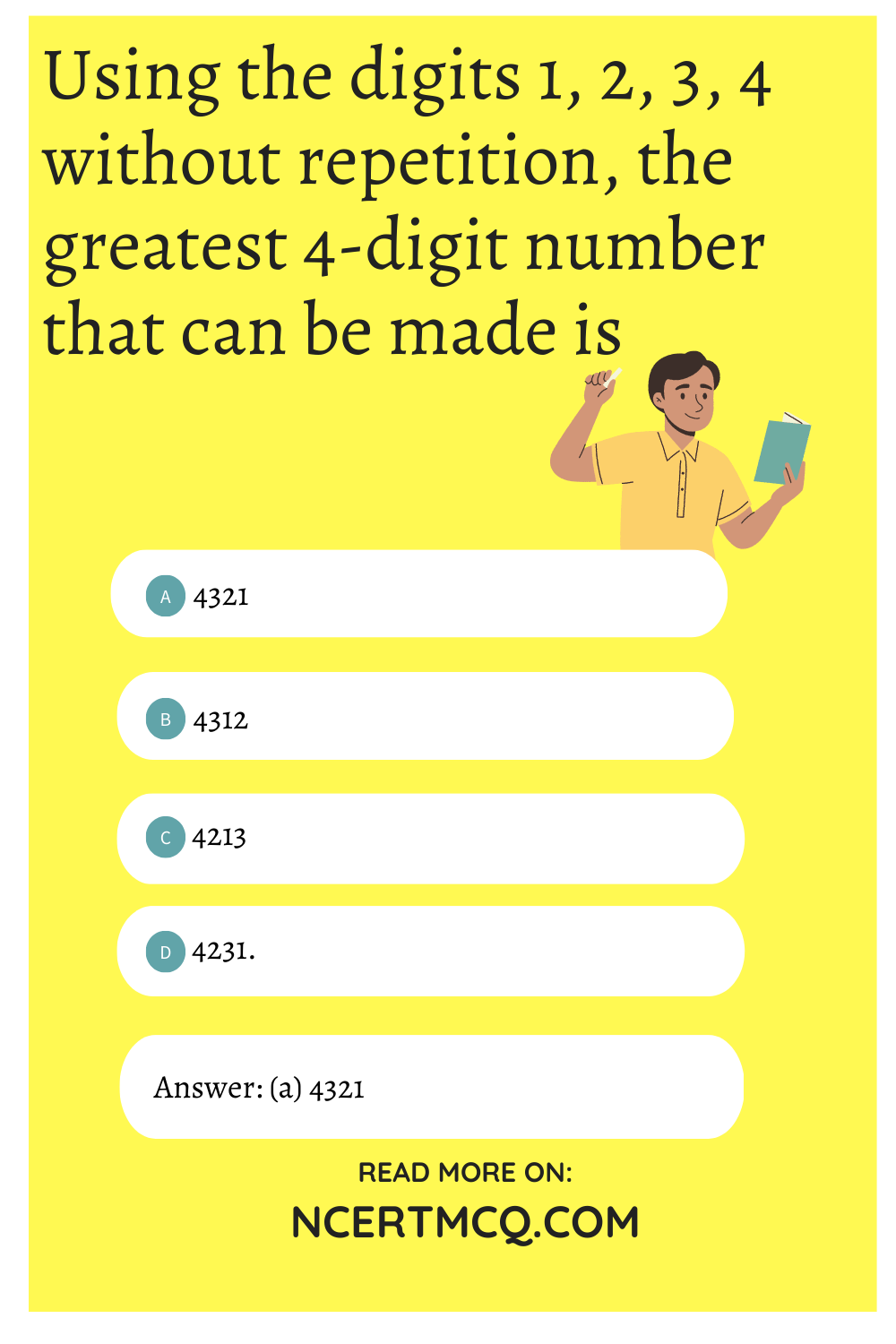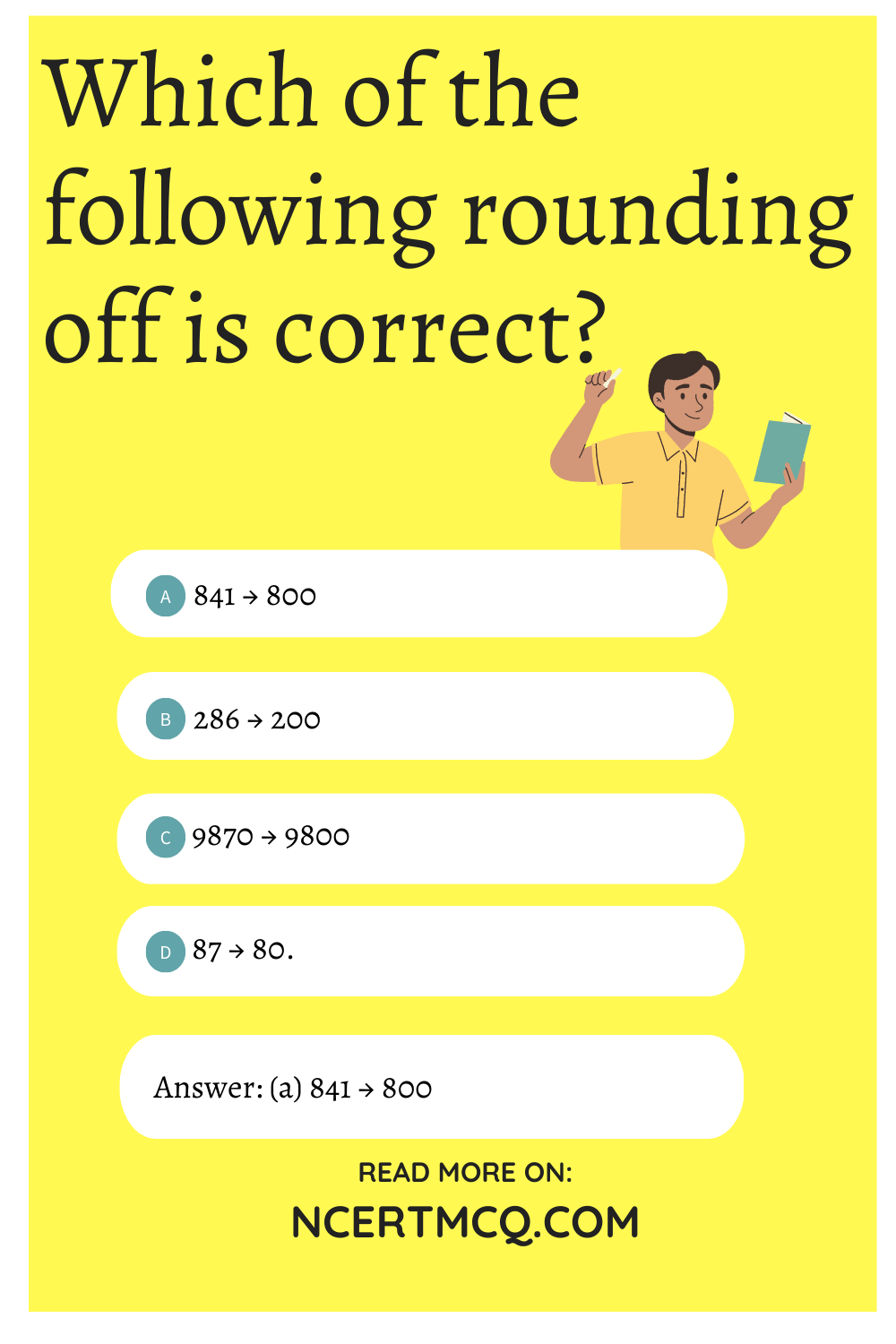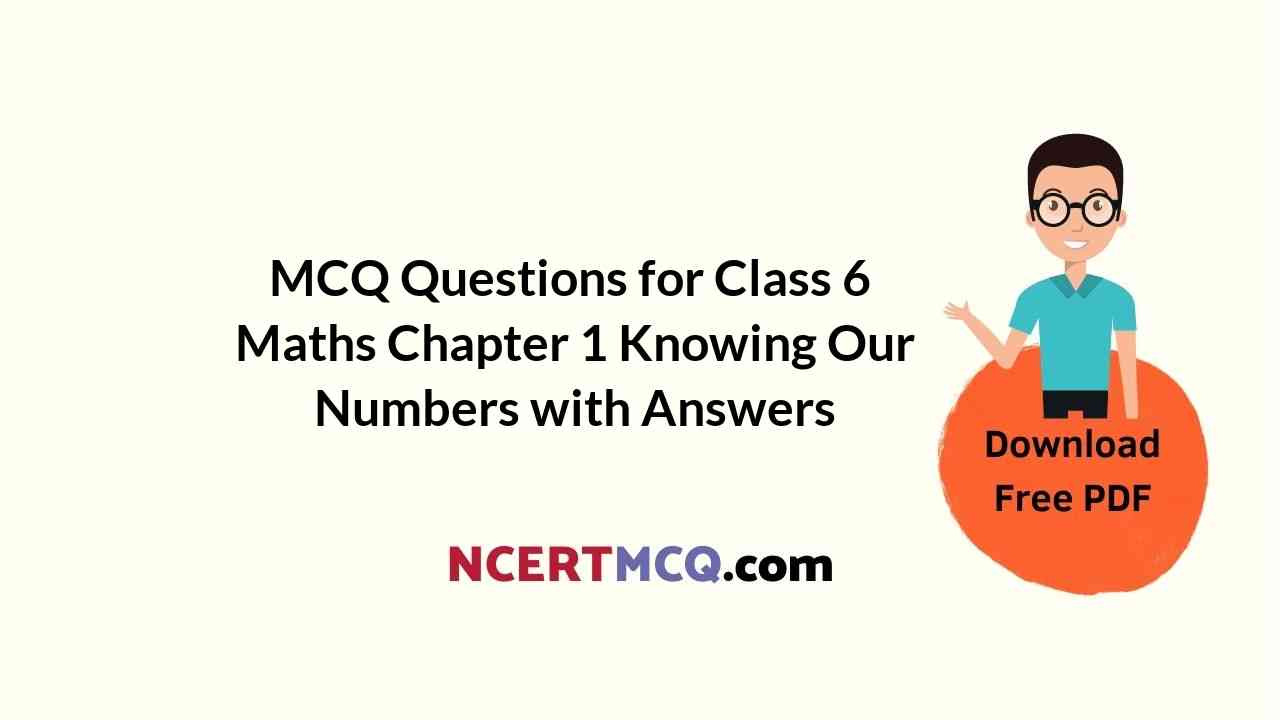Check the below NCERT MCQ Questions for Class 6 Maths Chapter 1 Knowing Our Numbers with Answers Pdf free download. MCQ Questions for Class 6 Maths with Answers were prepared based on the latest exam pattern. We have provided Knowing Our Numbers Class 6 Maths MCQs Questions with Answers to help students understand the concept very well.
Students can also refer to NCERT Solutions for Class 6 Maths Chapter 2 Knowing Our Numbers for better exam preparation and score more marks.
Knowing Our Numbers Class 6 MCQs Questions with Answers
Class 6 Maths Chapter 1 MCQ Question 1.
The greatest of the numbers
123, 27, 650, 2342, 40000 is
(a) 40000
(b) 2342
(c) 27
(d) 650.
Answer
Answer: (a)
MCQ Questions For Class 6 Maths Chapter 1 Question 2.
The greatest of the numbers
1000,10000,10,1000000,100000 is
(a) 1000000
(b) 100000
(c) 10000
(d) 1000.
Answer
Answer: (a)
MCQ On Knowing Our Numbers Class 6 Question 3.
The smallest of the numbers
1000,50000,111,3222,225 is
(a) 111
(b) 225
(c) 1000
(d) 3222.
Answer
Answer: (a)
Knowing Our Numbers Class 6 MCQ Question 4.
The smallest of the numbers
2325,2352,2235,2253,2523,2532 is
(a) 2235
(b) 2253
(c) 2325
(d) 2532.
Answer
Answer: (a)
Class 6 Maths MCQ Chapter 1 Question 5.
Using the digits 1, 2, 3, 4 without repetition, the greatest 4-digit number that can be made is
(a) 4321
(b) 4312
(c) 4213
(d) 4231.
Answer
Answer: (a)

MCQ Class 6 Maths Chapter 1 Question 6.
Using the digits 1, 5, 7, 2 without repetition, the greatest 4-digit number that can be made is
(a) 7521
(b) 7512
(c) 7215
(d) 7251.
Answer
Answer: (a)
MCQ For Class 6 Maths Chapter 1 Question 7.
Using the digits 3, 5, 7, 0 without repetition the greatest 4-digit number that can be made is
(a) 7530
(b) 7503
(c) 7350
(d) 7305.
Answer
Answer: (a)
Knowing Our Numbers MCQ Question 8.
The smallest 4-digit number that can be made using the digits 1,8,5,3 without repetition is
(a) 1583
(b) 1538
(c) 1385
(d) 1358.
Answer
Answer: (d)
Class 6 Maths Chapter 1 MCQ Test Question 9.
The smallest 4-digit number that can be made using the digits 5,3,6,4 without repetition is
(a) 3546
(b) 3564
(c) 3456
(d) 3465.
Answer
Answer: (c)
MCQ Maths Class 6 Chapter 1 Question 10.
The smallest 4-digit number that can be made using the digits 6, 5, 0, 4 without repetition is
(a) 4560
(b) 4056
(c) 4065
(d) 4506.
Answer
Answer: (b)
MCQ Questions For Class 6 Maths Ncert Chapter 1 Question 11.
Make the greatest 4-digit number by using any one digit of 2. 6. 5 twice.
(a) 6652
(b) 6625
(c) 6256
(d) 6265.
Answer
Answer: (a)
Class 6 Math Chapter 1 MCQ Question 12.
Make the greatest 4-digit number by using any one digit of 0, 3, 6 twice.
(a) 6630
(b) 6603
(c) 6360
(d) 6306.
Answer
Answer: (a)
MCQ Questions Class 6 Maths Chapter 1 Question 13.
Make the smallest 4-digit number by using any one digit of 4,3,2 twice.
(a) 2234
(b) 2243
(c) 2432
(d) 2324.
Answer
Answer: (a)
Class 6 Maths Chapter 1 MCQ Questions Question 14.
Make the smallest 4-digit number by using any one digit of 7, 0, 6 twice.
(a) 6007
(b) 6070
(c) 6700
(d) None of these.
Answer
Answer: (a)
Class 6th Maths Chapter 1 MCQ Question 15.
Take two digits, say 1 and 2. Make the greatest 4-digit number using both the digits equal number of times.
(a) 1122
(b) 2112
(c) 2121
(d) 2211.
Answer
Answer: (d)
Class 6 Maths Ch 1 MCQ Question 16.
Take two digits, say 3 and 4. Make the smallest 4-digit number using both the digits equal number of times.
(a) 3344
(b) 4433
(c) 4343
(d) 4334.
Answer
Answer: (a)
Question 17.
Take two digits 0 and 1. Make the greatest 4-digit number using both the digits equal number of times.
(a) 1100
(b) 1001
(c) 1010
(d) None of these.
Answer
Answer: (a)
Question 18.
Take two digits, 0 and 1. Make the smallest 4-digit number using both the digits equal number of times.
(a) 1001
(b) 1010
(c) 1100
(d) None of these.
Answer
Answer: (a)
Question 19.
Make the greatest 4-digit number using any four different digits with the condition that 5 is at ones place.
(a) 9875
(b) 9857
(c) 9758
(d) 9785.
Answer
Answer: (a)
Question 20.
Make the smallest four-digit number using any four different digits such that 5 is at ones place,
(a) 1025
(b) 1205
(c) 1250
(d) None of these.
Answer
Answer: (a)
Question 21.
Arrange the following numbers in ascending
order: 132,2000,7500,525.
(а) 7500,2000,525,132
(b) 132,525,2000,7500
(c) 132,525,7500,2000
(d) 7500,2000,132,525.
Answer
Answer: (b)
Question 22.
Arrange the following numbers in descending
order: 4000,8500,50600,7235.
(а) 50600,8500,7235,4000
(b) 50600,8500,4000,7235
(c) 50600,7235,8500,4000
(d) 50600,7235,4000,8500.
Answer
Answer: (a)
Question 23.
The greatest 2-digit number is
(a) 98
(b) 99
(c) 79
(d) 89.
Answer
Answer: (b)
Question 24.
The smallest 2-digit number is
(a) 31
(b) 21
(c) 11
(d) 10.
Answer
Answer: (d)
Question 25.
The greatest 3-digit number is
(a) 991
(b) 997
(c) 999
(d) 998.
Answer
Answer: (c)
Question 26.
The smallest 3-digit number is
(a) 100
(b) 101
(c) 111
(d) none of these.
Answer
Answer: (a)
Question 27.
The greatest 4-digit number is
(a) 8888
(b) 6789
(c) 9876
(d) 9999.
Answer
Answer: (d)
Question 28.
The smallest 4-digit number is
(a) 1001
(b) 1000
(c) 1111
(d) 9999.
Answer
Answer: (b)
Question 29.
Which of the following numbers comes next to 999?
(a) 100
(b) 998
(c) 1000
(d) None of these.
Answer
Answer: (c)
Question 30.
Which of the following numbers comes just before 1000?
(a) 999
(b) 1001
(c) 990
(d) 909.
Answer
Answer: (a)
Question 31.
Which of the following numbers is equal to 1 lakh?
(a) 100000
(b) 10000
(c) 1000
(d) 100.
Answer
Answer: (a)
Question 32.
Which of the following numbers is equal to 1 crore ?
(a) 10000000
(b) 1000000
(c) 100000
(d) 10000.
Answer
Answer: (a)
Question 33.
1 million = how many lakh?
(a) 10
(b) 100
(c) 1000
(d) 10000.
Answer
Answer: (a)
Question 34.
1 crore = how many million?
(a) 10000
(b) 1000
(c) 100
(d) 10.
Answer
Answer: (d)
Question 35.
1 billion.= how many million?
(a) 10
(b) 100
(c) 1000
(d) 10000.
Answer
Answer: (c)
Question 36.
1 lakh = how many ten thousand?
(a) 1
(b) 10
(c) 100
(d) 1000.
Answer
Answer: (b)
Question 37.
1 million = how many hundred thousand?
(a) 10
(b) 100
(c) 1
(d) None of these.
Answer
Answer: (a)
Question 38.
1 crore = how many ten lakhs?
(a) 100
(b) 1
(c) 10
(d) None of these.
Answer
Answer: (c)
Question 39.
Insert comma suitably in 67810138 by using International System.
(a) 67,810,138
(b) 67,81,01,38
(c) 6,78,10,138
(d) 678,10,138.
Answer
Answer: (a)
Question 40.
1 centimetre =? millimetres
(a) 10
(b) 100
(c) 1000
(d) none of these.
Answer
Answer: (a)
Question 41.
1 metre =? centimetres
(a) 10
(b) 100
(c) 1000
(d) none of these.
Answer
Answer: (b)
Question 42.
1 metre =? millimetres
(a) 10
(b) 100
(c) 1000
(d) none of these.
Answer
Answer: (c)
Question 43.
1 Kilometre =? metres
(a) 1000
(b) 10
(c) 100
(d) none of these.
Answer
Answer: (a)
Question 44.
1 km = ? mm
(a) 10,00,000
(b) 1,00,000
(c) 10,000
(d) 1000.
Answer
Answer: (a)
Question 45.
49 to the nearest tens is
(a) 50
(b) 40
(c) 45
(d) 55.
Answer
Answer: (a)
Question 46.
123 to the nearest tens is
(a) 130
(b) 120
(c) 125
(d) 123.
Answer
Answer: (b)
Question 47.
Which of the following rounding off is correct?
(a) 841 → 800
(b) 286 → 200
(c) 9870 → 9800
(d) 87 → 80.
Answer
Answer: (a)

Question 48.
In Roman numerals L stands for
(a) 100
(b) 50
(c) 70
(d) 90.
Answer
Answer: (b)
Question 49.
In Roman numerals C stands for
(a) 10
(b) 100
(c) 1000
(d) 1.
Answer
Answer: (b)
Question 50.
In Raman numerals D stands for
(a) 100
(b) 1000
(c) 500
(d) 10.
Answer
Answer: (c)
Question 51.
In Raman numerals M stands for
(a) 1000
(b) 100
(c) 10
(d) none of these.
Answer
Answer: (a)
Question 52.
60 in Roman numerals is
(a) LX
(b) LXX
(c) LXXX
(d) XL.
Answer
Answer: (a)
Question 53.
80 in Roman numerals is
(a) LXXX
(b) LXX
(c) LX
(d) XXXL.
Answer
Answer: (a)
Question 54.
90 in Roman numerals is
(a) XL
(d) XC
(c) CX
(d) LX.
Answer
Answer: (b)
Question 55.
I made an expenditure of ₹ 2725 in November, 2009 and of ₹ 2275 in December, 2009. What is the total expenditure made by me in November, 2009 and December, 2009 together?
(a) ₹ 2000
(b) ₹ 3000
(c) ₹ 4000
(d) ₹ 5000.
Answer
Answer: (d)
Hint:
Total expenditure = 2725 + 2275 = 5000
Question 56.
The difference between the greatest number of 4-digit and the smallest number of 5-digit is
(a) 1
(b) 10
(c) 100
(d) 11.
Answer
Answer: (a)
Hint:
Difference = 10,000 – 9999 = 1
Question 57.
The monthly salary of Apala is ₹ 20975 and that of Meenu is ₹ 15875. The difference of their monthly salaries is
(a) ₹ 6000
(b) ₹ 4900
(c) ₹ 5000
(d) ₹ 5100.
Answer
Answer: (d)
Hint:
Difference = 20975 – 15875 = 5100
Question 58.
To stitch a trouser 1 m 25 cm cloth is required. Out of 10 m cloth, how many trousers can be stitched?
(a) 2
(b) 4
(c) 6
(d) 8.
Answer
Answer: (d)
Hint:
1 m 25 cm = 125 cm
10m = 1000cm
1000 ÷ 125 = 8
Question 59.
Manish multiplied 100 by 89 instead of multiplying by 79. How much was his answer greater than the correct answer?
(a) 100
(b) 1000
(c) 10000
(d) None of these.
Answer
Answer: (b)
Hint:
100 × 89 = 8900
100 × 79 = 7900
8900 – 7900 = 1000
Question 60.
Sangeeta types 25 pages per day. How many pages will she type in the month of November ?
(a) 900
(b) 800
(c) 700
(d) 750
Answer
Answer: (d)
Hint:
Number of days in
November, 2009 = 30
25 × 30 = 750
We hope the given NCERT MCQ Questions for Class 6 Maths Chapter 1 Knowing Our Numbers with Answers Pdf free download will help you. If you have any queries regarding Knowing Our Numbers CBSE Class 6 Maths MCQs Multiple Choice Questions with Answers, drop a comment below and we will get back to you soon.
